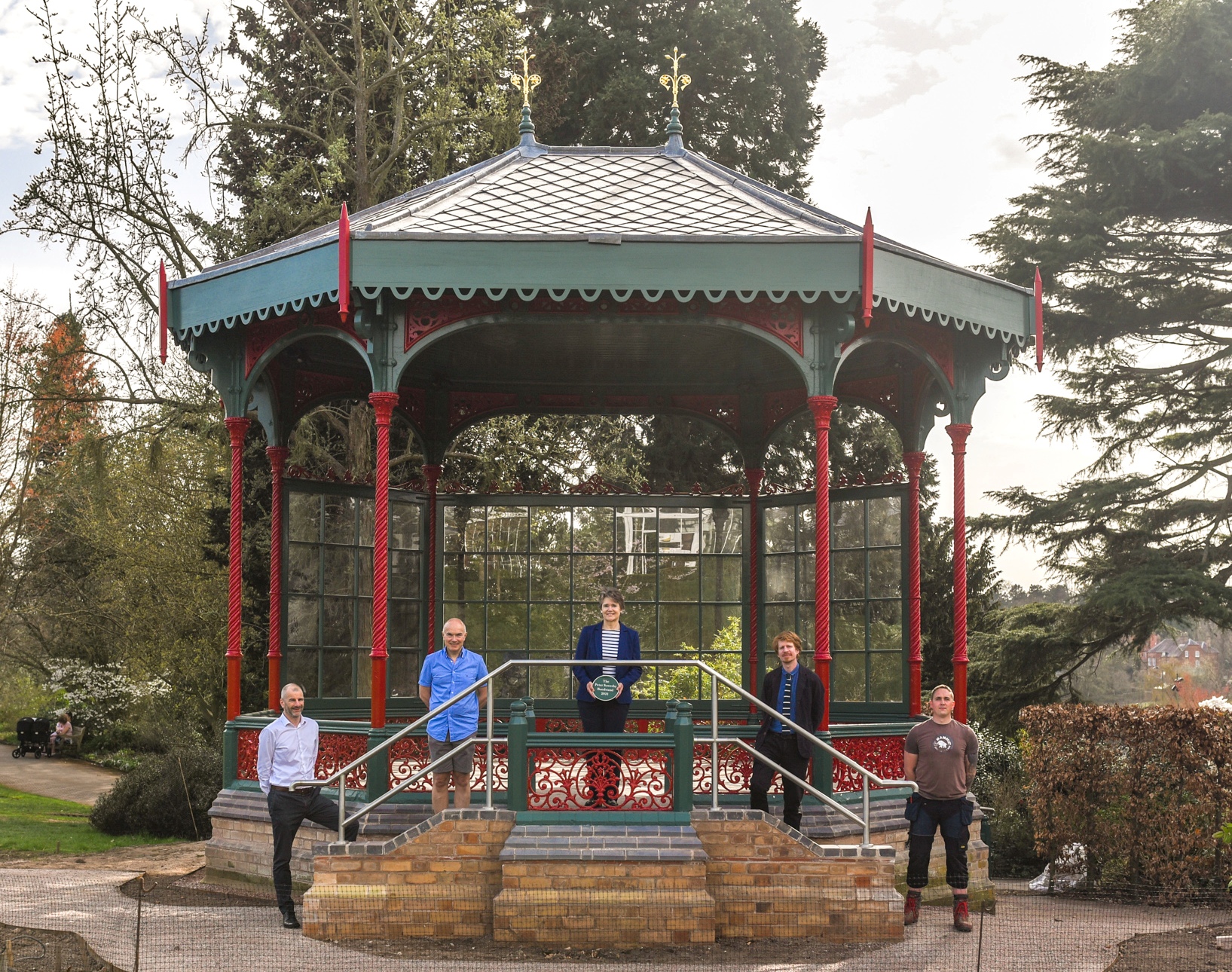Restoration of Birmingham Botanical Gardens’ historic bandstand complete
 The historic, Grade II listed bandstand at the Birmingham Botanical Gardens has been restored to its former 1874 glory after six months of painstaking work by conservation specialists.
The historic, Grade II listed bandstand at the Birmingham Botanical Gardens has been restored to its former 1874 glory after six months of painstaking work by conservation specialists.
The local landmark, which sits in the Gardens’ Grade II* listed 15-acre grounds in Edgbaston, has been completely transformed, following a 12-month fundraising campaign that raised £138,000.
Extensive work included reinstating some original features – including the colour scheme, as well as restoring the roof and lead, timbers, brickwork, mouldings, gold finials and acoustic screen. There have also been sympathetic adaptations, such as new steps.
The bandstand, where Neville Chamberlain gave his first public speech as Prime Minister in 1937 and was later used as an air raid shelter in the Second World War, has been named The Peter Sowerby Bandstand, following a substantial donation from The Peter Sowerby Foundation.
Liz Frostick, development director at the charity, said it will be used as a platform for live music, weddings, other events, such as heritage and horticultural tours, and as an all-weather outdoor space for school groups.
“The bandstand looks stunning and we’re absolutely thrilled with the quality of the restoration work, which takes it back to its heyday, when it was first designed by distinguished Birmingham architect FB Osborn,” she said.
“It is a real testament to the expertise of the conservationists who went over every inch of the structure, used historic documents and drew on their expertise to restore it to how it looked when it was first unveiled almost 150 years ago.
“This local heritage gem will be a fantastic space for musicians and events. We’ve no doubt our visitors will appreciate the work that has been done to ensure it is safeguarded for another 50 years and beyond.”
Birmingham-based Donald Insall Associates, the architect practice that carried out the works, commissioned specialist paint restoration company Crick-Smith to undertake historic paint analysis to reveal how decorative schemes have evolved over the years.
Its examination revealed the bandstand has been redecorated up to 18 times during its history, with the earliest and most significant scheme, which dates back to 1874, identifying a two-tone treatment of dark blue/green with a dark red, both in lead-based oil paints – common during the Victorian era. This helped to inform the decorative scheme used in the bandstand’s restoration.
Matthew Vaughan, associate director at Donald Insall Associates, said the paint analysis also showed a dramatic change occurred in 1936, when bitumen was applied over the aluminium on the trellis and the rest of the structure was painted plain lead white.
The use of bitumen on the lower grilles was not found anywhere else and may relate to the start of the Second World War when the basement room was used as an air raid shelter, he said.
The base was given an additional brick skim to block the window and the bright aluminium decoration was given a coat of black bitumen to minimise reflection.
“This conservation project has included repairs which restored lost features, such as the diamond pattern Welsh slates and colour scheme, as well as sympathetic adaptions to make it accessible to the public, including the addition of steps and adaption of the cast iron balustrade,” said Matthew.
“This project would not have been possible without the expertise and dedication of our team of contractors and consultants, including Crick-Smith, Mann Williams, PMP Consultants and contractor Reynolds Conservation, who together have reinstated the bandstand’s pride of place as a focal point in the Botanical Gardens.”
Ashley Reynolds, managing director of Reynolds Conservation Ltd, which undertook specialist joinery as well as manufacturing new lead box gutters, installing the diamond Welsh slate and gold leaf finials.
“We have really enjoyed working with Donald Insall, a highly skilled conservation practice, understanding what is involved with this flagship project and we’re pleased with the overall high standard of workmanship,” he said. “The bandstand will now have a great outside focal point in the gardens and bring great future prospects for everyone to enjoy.”
PMP Consultants were appointed as cost consultants for the project, which started in September 2020.
Martin Rowe, Senior Director of PMP Consultants, said: “It was a joy to work alongside the team to bring back the bandstand to its former glory. Having spent many years as a member of the Botanical Gardens it was a privilege to act as cost consultants.”
The project has had the support of several prestigious national and local trusts and foundations, as well as individual supporters. As well as the major donation from the Peter Sowerby Foundation, without which the project would not have been possible, the Gardens also received donations from: The Garfield Weston Foundation, GJW Turner Trust, 29th May 1961 Trust, Loppylugs & Barbara Morrison Trust, Feeney Trust, Grimmitt Trust, Limoges Trust, and George Henry Collins Trust.
As a charity the Gardens, which is one of the UK’s most historically important botanic gardens and is home to four Victorian glasshouses, receives no regular public funding. Instead, it relies on the generosity of public donations, grants and income it can generate through conferences, weddings and other events.













